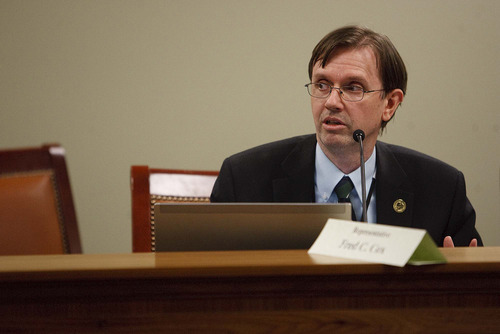This is an archived article that was published on sltrib.com in 2013, and information in the article may be outdated. It is provided only for personal research purposes and may not be reprinted.
A group calling themselves "Count My Vote" has threatened both political parties with a voter initiative that would change Utah's current system for selecting candidates by neighborhood caucus and political party convention.
The challenge is being led by Republican LaVarr Webb, a political consultant and lobbyist, policy deputy to then Gov. Mike Leavitt and a former Deseret News managing editor.
Many of proposed changes have already been rejected by the Republican State Central Committee. State Democratic Party chair Jim Dabakis has told his party not to support or sign the initiative and is asking delegates to the Democratic state convention if they should keep the system they have.
This Saturday, as many as 4,000 state Republican delegates are being asked not only to select state party leaders, but decide on proposed changes to the Republican caucus and convention system.
Some changes are fairly simple: Allow a time other than 7 p.m. to begin caucus meetings, permit party bylaws to designate the caucus agenda, the time and procedures for registering caucus participants and electing state delegates. The delegates are also voting to have the state central committee discuss and consider possible future improvements to the caucus/convention system.
The sticking point seems to be the current 60 percent threshold for the number of delegate votes necessary for a candidate to avoid a primary, allowing a challenger the opportunity to eliminate an incumbent, and yet requiring a challenger to be a strong candidate. I believe the 60 percent threshold works.
The proposal from the "Count My Vote" crowd wasn't just to raise the threshold, but to remove multi-round voting and send all candidates who hit the lower threshold to the primary.
For these races, we already have over one-half of contested races go to a primary. We don't need two-thirds of them. If we have more primaries, we are apt to have more last-minute attacks on candidates. There will also be a need for more political donations raised for the more expensive races. We don't need to provide more power to lobbyists and corporations.
If you are going to run as a Democratic candidate, you have to comply with their rules. If you are going to run as a Republican, you have to comply with their rules. If you don't like those rules, you can run as unaffiliated or independent or as a third party candidate. "Count My Vote" is attempting to change all party rules by changing state laws by initiative, thus bypassing the political parties and the Legislature.
The system can be better. We could make sure that neighborhood caucuses could be done in two hours, and the election results distributed not just to the county and state parties, but to those who missed the caucus, so they can learn who represents them and who to contact to make their views known. Any person who got a babysitter for two hours to attend a caucus meeting should be able to vote within that time frame.
The current system is the best way to make sure this grass-roots process can work. It is the only way someone with $100,000 in campaign donations can go up against someone with $2 million. And the current one-on-one candidate vetting by delegates cannot be done well any other way.
The present system does not protect the incumbent, the wealthy or the famous. Keep fair elections in Utah.
Fred C. Cox is an architect, Republican State Central Committee member, and a former member of the Utah House of Representatives. He lives in West Valley City.



